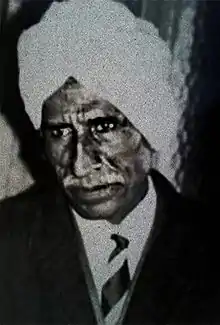Gurdas Ram Alam | |
|---|---|
 Alam at Derby England 1972 | |
| Born | 1912 Bundala, Jalandhar, Punjab, British India |
| Died | 1989 (aged 76–77) |
| Occupation | Poet, Bhatta Mazdoor |
| Nationality | Indian Punjabi |
| Period | 1937–1973 |
| Subject | Inequality, revolution, social change |
| Literary movement | Progressive poetry |
| Notable works | Alam Kav (1965) |
Gurdas Ram Alam (1912–1989), was a Punjabi language poet born in Bundala village of Jalandhar, Punjab. He was a progressive poet and an activist poet from a marginalized part of the society known as Dalits, and he is known as the first Punjabi Dalit poet.[1][2] He was from a working-class family and lived in small mud house in village.[3] Alam did not go to school, he learned reading and writing Gurmukhi from his friends. Being a working-class child he started working at a very young age, and he also started writing poems from his childhood. His first source of inspiration for getting into writing was oppression by the rich on the poor people that he experienced while working as child labor.[3] Despite being illiterate, he emerged as a popular name in Punjabi folk poetry before the partition of India. Alam is recognised as a Dalit activist poet[4] and the voice of deprived, oppressed castes and communities.
Life and work
Gurdas Ram Alam was born in Bundala village of Jalandhar, Punjab. His mother's name was Jioni and father's name, Shri Ram. Alam worked as bhatta majdoor and construction worker from a very young age. His work as a child labourer became his inspiration for writing poems which became his way of expression of how he felt being a working-class boy.[5] He remained uneducated because his family could not support sending him to school.
Writing
Style and influence
He was contemporary of Shiv Kumar Batalvi, Avtar Singh Paash, Amrita Pritam and Prof. Mohan Singh. He had one friend from the village, the Marxist leader Harkishan Singh Surjeet, and became influenced by Marxism and Naxalite Movement.[6][7] He had been jailed a few times. People called him a communist because his poetry was direct Punjabi expression of marxist philoshopy.[8] Later Sant Ram Udasi and Lal Singh Dil followed the same creed and emerged as descendants Alam, their work served as inspiration for Naxalite movement of Punjab in 1960's.[6][5] He was very close to some old Punjabi poets like Nand Lal Noorpuri, Vidhata Singh Teer and Firoz Din Sharaf.
As a poet of Dalit-consciousness he was also inspired by the thought and philosophy of B. R. Ambedkar. He wrote a poem "Bada shor painda gareeban de vehre" which recited in Ambedkar's presence during a public meeting in 1959 at Bootan Mandi Jalandhar, Punjab.[9]
References
- ↑ Nayar, Rana (2017-07-05). Cultural Studies in India. Routledge. ISBN 9781351570374.
- ↑ "Heritage of Punjabi Dalit Literature and its Exclusion from Histories". roundtableindia.co.in. Retrieved 2019-04-25.
- 1 2 "Paash Gurdas Ram Alam". dokumen.tips. Retrieved 2019-04-29.
- ↑ "Poets translating Poets – Essays – Goethe-Institut". www.goethe.de. Retrieved 2019-04-30.
- 1 2 "Histories that make the heart quake". fountainink.in. Retrieved 2019-04-30.
- 1 2 Singh, Paramjeet (2018-04-07). Legacies of the Homeland: 100 Must Read Books by Punjabi Authors. Notion Press. ISBN 9781642494242.
- ↑ Alam, Gurdas Ram (Jun 26, 2016). "Folk culture of Doaba revisited". Tribune India. Retrieved Jun 26, 2016.
- ↑ "GURDASS RAM ALAM". upkaar.com. Retrieved 2019-05-10.
- ↑ "126th Birth Anniversary of Baba Sahib Dr. B.R. Ambedkar celebrated | City Air News". cityairnews.com. Retrieved 2019-04-30.